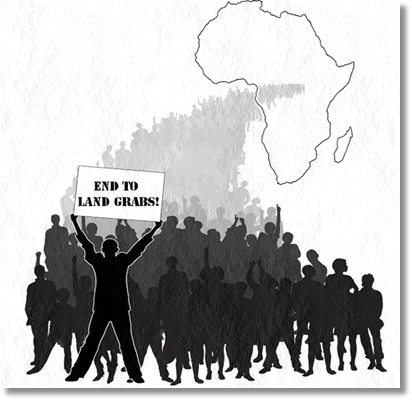Taming Global Land Grabs

 |
Dwindling public support for agriculture sector
Public support for the development of agriculture sector has however been dwindling over the last decade, witnessed by the concerted withdrawal of state actors and substitution by massive recruitment of private sector players to finance the sector. Rural smallholder food producers, who feed the nations, have thus suffered severe limitations in access to inputs and extension support. In some villages in Vietnam for instance, borrowed capital landed rural farmers into problems including some having their land auctioned to service debts. In his book, Raj Patel speaks of soaring rates of suicide in India due to inability to repay debts. The lack of access to timely extension support has engendered unwarranted losses, greatly undermining the production and productivity of many rural smallholder producers. These among many others, have been some of the factors providing an easy exit route for farmers from the agriculture sector.
Increasing risk of displacement due to land grabbing
In their quest for foreign direct investment (FDI), many southern governments have incentivized multi-national corporations to invest in the seemingly neglected rural areas with a view to spur development. Incentives have ranged from tax holidays, cheap or free land to relaxing key safeguards and policies to appease investors. These moves not only deny developing economies the much needed tax revenue, but also subject rural households to increased pressure and unwarranted displacements from their lands to pave way for these projects.
Recent investigations revealed that between 2004 -2014, World Bank projects physically or economically displaced 3.4 million people. As in the case of Bagamoyo in Tanzania and Ndiael in Senegal, communities are often poorly or not consulted at all when such investment projects are initiated. Needless to say, many rural communities bear the brunt of these state-backed land grabs that have often left trails of human rights violations in their wake. The media today is awash with numerous examples of land grabbing in Kenya, Uganda, Mozambique, Sierra Leone and Senegal, pitching the State and corporations on one hand, against communities/citizens on the other.
Safeguards exist, but implementation is weak
The primary responsibility of the State is always to fulfil, promote and protect the fundamental human rights of her citizens. On the contrary though, corporations seem to enjoy much more protection, rights and freedoms from the State than citizens. Globally, frameworks exist that provide useful reference for improving the governance of tenure to reduce vulnerability for rural communities, especially women. However, their implementation is weak, as some countries are yet to adapt them.
For instance, the United Nations Committee on World Food Security, the most comprehensive United Nations forum gathering governments, inter-governmental organizations, civil society and the private sector, developed the Voluntary Guidelines on the Responsible Governance of Tenure of Land, Fisheries and Forests in the Context of National Food Security, which require States to fully recognize and respect the rights of all legitimate land users. Likewise, the Africa Union’s guiding principles on large scale land based investments in Africa, developed consultatively with governments and civil society; provide useful safeguards to protect communities from forceful unwarranted dispossession. These frameworks underscore the need for transparency, full disclosure in negotiation of contracts, besides requiring free, prior and informed consent of affected communities.
Call to action
In one of its latest report, ActionAid international calls on governments and donor institutions to take four vital steps to tame this wave of land grabs in Africa, among them ensuring that the Tenure Guidelines become a precondition for any considered land based investment. Further, the report points to the need to regulate businesses involved in land deals so that they observe human rights due diligence. A report by Grain concludes that corporations don’t feed the world; it is the smallholder producers who control a whopping 70% of all arable farmland. Thus the more reason why States must do all within their means to review policies and projects that incentivize land grabbing, and instead support policies that prioritize the needs of small scale food producers, particularly women. Will the African Heads of States and the leadership of the G7 Act on these recommendations?
By David Barissa
The author is the International Campaigner, working on the #LandFor campaign at ActionAid International.
